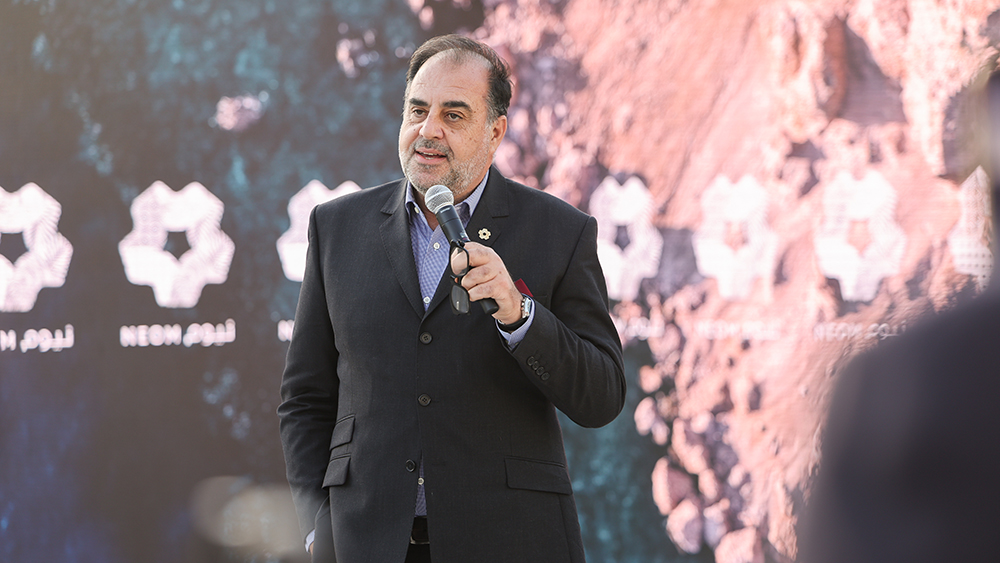How Neom’s Wayne Borg Gets Producers to Bring Projects to Middle East
Centered on a theme of celebrating locations on screen, Variety held a cocktail reception on the rooftop of Neuehouse in Hollywood Wednesday night, presented by Neom, a sustainable megacity and regional production hub located within Saudi Arabia’s northwestern corner.
The event was attended by producers, production supervisors, location managers and others from across the film, television and content creation industries, offering Wayne Borg, Neom’s managing director of media, entertainment and culture, an opportunity to introduce others to what the region has to offer and incentivize decision-makers to consider bringing their productions to the Middle East.
“We really want to work with the industry, whether it’s for your production or if you’ve got a service business that can help us develop the ecosystem,” Borg said in opening remarks, welcoming attendees. “We’re really happy to be here. We’re so pleased that you’ve come out to hear our story, our vision and what’s happening out there and the reality of it.”
During an on-site showcase earlier this month that brought a reported 140 global leaders from across the film and TV industry to the region, Neom unveiled the opening of its fourth fully operational soundstage.
“We had people from the U.S., from the U.K., Germany, India, France, Turkey,” Borg said in an interview with Variety reflecting on the showcase. “It’s a global industry now. We had a lot of heads of various film companies, producers, financiers, investors, as well as service providers. It’s about how this ecosystem’s evolving, and now that they’ve seen what’s happening on the ground, we’re demonstrating that proof of concept. There’s a real sort of energy about getting involved in it, which is fantastic.”
In addition to supporting productions with its growing offering of soundstages, full-service support facilities, cash rebate incentives and resort-style accommodations, Neom boasts proximity to diverse geographic locations, including easy access to the Red Sea, mountain ranges and desert environments.
“As Jeremy Bolt, who’s one of the producers who’s worked out there, said, it lends itself to a number of a genres, from science fiction to romance to action to literally big, epic films,” explained Borg. “So, to that end, it’s flexible and then when you add in the stage component, there isn’t anywhere in the region that has that mix of diversity in locations coupled with state-of-the-art facilities, with a great incentive of course.”
Unveiled in September 2022 in tandem with the opening of the Neom Media Village and Bajdah Desert Studios, the rebate incentive provides 40%-plus of spend in cash back for productions that recruit local crew and talent above and below the line, with producers “able to secure a higher percentage based on their industry development contributions.”
When it comes to the genre or type of content being produced, Borg explains Neom operates “agnostically.” The region has already hosted 30 completed productions over the last year and a half and is welcoming productions of every sort and size.
“We work closely with the producers and the line producers to make sure that it works. It has to work for them,” Borg said. “We’ve got a lot of gear on the ground now. We’ve got the facilities, we’ve got accommodation. So every project, we treat on its merits, and we work with [productions] closely to make sure we can deliver what they need. And we’re very much in the ‘yes’ business. Ultimately, the success of productions and our ability to support them comes down to working with them closely and making them a success. For us, it is about providing a seamless experience and delivering on budget, on time, every time.”
Borg added, “When you think about the Neom proposition overall, it is about redefining urbanism and how people are going to live and work in the future, and that relationship with both the built and natural environments, and in a context where cities are putting great stress on the planet. And Neom is about how do you address that, how do you create a sustainable model by driving efficiency in your infrastructure, in your transport, and minimizing use of cars and all the headaches that that creates? And that’s where I think we’re in this unique position where we don’t have legacy. We’re not trying to back engineer or try and work around existing infrastructure. We can create the optimum solution for the future now.”

